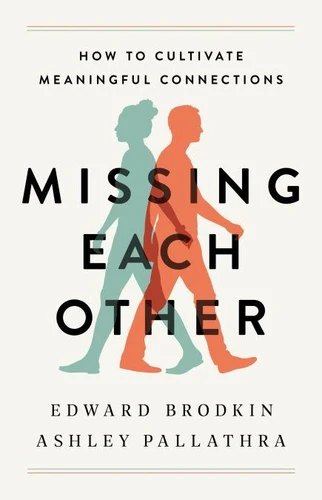Missing Each Other. How to Cultivate Meaningful Connections
Par : ,Formats :
Disponible dans votre compte client Decitre ou Furet du Nord dès validation de votre commande. Le format ePub protégé est :
- Compatible avec une lecture sur My Vivlio (smartphone, tablette, ordinateur)
- Compatible avec une lecture sur liseuses Vivlio
- Pour les liseuses autres que Vivlio, vous devez utiliser le logiciel Adobe Digital Edition. Non compatible avec la lecture sur les liseuses Kindle, Remarkable et Sony
- Non compatible avec un achat hors France métropolitaine
 , qui est-ce ?
, qui est-ce ?Notre partenaire de plateforme de lecture numérique où vous retrouverez l'ensemble de vos ebooks gratuitement
Pour en savoir plus sur nos ebooks, consultez notre aide en ligne ici
- Nombre de pages256
- FormatePub
- ISBN978-1-4721-4603-8
- EAN9781472146038
- Date de parution13/01/2021
- Protection num.Adobe DRM
- Infos supplémentairesepub
- ÉditeurRobinson
Résumé
In our fast-paced, tech-obsessed lives, rarely do we pay genuine, close attention to one another. With all that's going on in the world, and the never-ending demands of our daily lives, most of us are too stressed and preoccupied with our own thoughts and worries to be able to really listen to each other for long. Often, we seem to somehow "miss" each other, misunderstand each other, or talk past each other.
Our ability to tune in to ourselves and to others seems to be withering. Many of us are left wishing for someone who could really listen, understand, and genuinely connect with us. In Missing Each Other, researchers and clinicians Edward Brodkin and Ashley Pallathra argue that we must find the ability to be in tune with each other again, and they show us how. Based on years of research that they conducted together in a National Institutes of Mental Health-funded clinical study, the authors take a wide-ranging and surprising journey through fields as diverse as social neuroscience and autism research, music performance, pro basketball, and tai chi.
They use these stories to introduce the four principal components of attunement: Relaxed Awareness, Listening, Understanding, and Mutual Responsiveness. They outline the science, research, and biology underlying these pillars of human connection, but also providing readers with exercises through which they can improve their own skills and abilities in each.
Our ability to tune in to ourselves and to others seems to be withering. Many of us are left wishing for someone who could really listen, understand, and genuinely connect with us. In Missing Each Other, researchers and clinicians Edward Brodkin and Ashley Pallathra argue that we must find the ability to be in tune with each other again, and they show us how. Based on years of research that they conducted together in a National Institutes of Mental Health-funded clinical study, the authors take a wide-ranging and surprising journey through fields as diverse as social neuroscience and autism research, music performance, pro basketball, and tai chi.
They use these stories to introduce the four principal components of attunement: Relaxed Awareness, Listening, Understanding, and Mutual Responsiveness. They outline the science, research, and biology underlying these pillars of human connection, but also providing readers with exercises through which they can improve their own skills and abilities in each.
In our fast-paced, tech-obsessed lives, rarely do we pay genuine, close attention to one another. With all that's going on in the world, and the never-ending demands of our daily lives, most of us are too stressed and preoccupied with our own thoughts and worries to be able to really listen to each other for long. Often, we seem to somehow "miss" each other, misunderstand each other, or talk past each other.
Our ability to tune in to ourselves and to others seems to be withering. Many of us are left wishing for someone who could really listen, understand, and genuinely connect with us. In Missing Each Other, researchers and clinicians Edward Brodkin and Ashley Pallathra argue that we must find the ability to be in tune with each other again, and they show us how. Based on years of research that they conducted together in a National Institutes of Mental Health-funded clinical study, the authors take a wide-ranging and surprising journey through fields as diverse as social neuroscience and autism research, music performance, pro basketball, and tai chi.
They use these stories to introduce the four principal components of attunement: Relaxed Awareness, Listening, Understanding, and Mutual Responsiveness. They outline the science, research, and biology underlying these pillars of human connection, but also providing readers with exercises through which they can improve their own skills and abilities in each.
Our ability to tune in to ourselves and to others seems to be withering. Many of us are left wishing for someone who could really listen, understand, and genuinely connect with us. In Missing Each Other, researchers and clinicians Edward Brodkin and Ashley Pallathra argue that we must find the ability to be in tune with each other again, and they show us how. Based on years of research that they conducted together in a National Institutes of Mental Health-funded clinical study, the authors take a wide-ranging and surprising journey through fields as diverse as social neuroscience and autism research, music performance, pro basketball, and tai chi.
They use these stories to introduce the four principal components of attunement: Relaxed Awareness, Listening, Understanding, and Mutual Responsiveness. They outline the science, research, and biology underlying these pillars of human connection, but also providing readers with exercises through which they can improve their own skills and abilities in each.



